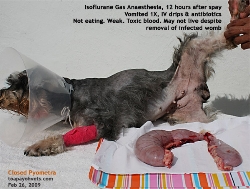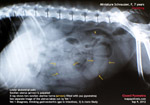 CASE
1. This was operated by me in 2009.
The father prohibited surgery as the
first dog died when given by an
injection by Vet 1. However, the dog
continued vomiting and so there was no
choice. The surgery was a success but
the dog continued vomiting. I had
already told the young lady that the
blood tests revealed kidney failure
before I operated. The dog did survive
but since the kidneys had failed, she
vomited for the next 10 days. Euthanasia
was done. This was a case whether the
older baby-boomer generation has not
much knowledge of the high fatality of
procrastination in seeking surgery
early. This case is recorded at:
CASE
1. This was operated by me in 2009.
The father prohibited surgery as the
first dog died when given by an
injection by Vet 1. However, the dog
continued vomiting and so there was no
choice. The surgery was a success but
the dog continued vomiting. I had
already told the young lady that the
blood tests revealed kidney failure
before I operated. The dog did survive
but since the kidneys had failed, she
vomited for the next 10 days. Euthanasia
was done. This was a case whether the
older baby-boomer generation has not
much knowledge of the high fatality of
procrastination in seeking surgery
early. This case is recorded at:http://www.sinpets.com/F5/20110438close-pyometra-schnauzer-iv-glucose-drips-catheter-toapayohvets-singapore.htm
 CASE
2. In this Aug 2012 case, operated
by my associate vet recently, the older
baby-boomer generation was the
60-year-old mother who did not want any
surgery in case her vomiting dog died on
the operating table. vomit and so why
not wait. My associate vet warded her
for 3 days with treatment given. One
sister (Sister 1) took the dog back as
the dog did not vomit. Conclusion was
that the dog had some stomach infection.
Then on the next evening, she brought
the dog back and told me she was
vomiting again. I was on reception duty
and that is the best place to pick up
complaints and feedback from clients.
Three days had passed and the
mis-diagnosis was gastritis. I examined
the dog in the presence of the associate
vet (Vet 1).
CASE
2. In this Aug 2012 case, operated
by my associate vet recently, the older
baby-boomer generation was the
60-year-old mother who did not want any
surgery in case her vomiting dog died on
the operating table. vomit and so why
not wait. My associate vet warded her
for 3 days with treatment given. One
sister (Sister 1) took the dog back as
the dog did not vomit. Conclusion was
that the dog had some stomach infection.
Then on the next evening, she brought
the dog back and told me she was
vomiting again. I was on reception duty
and that is the best place to pick up
complaints and feedback from clients.
Three days had passed and the
mis-diagnosis was gastritis. I examined
the dog in the presence of the associate
vet (Vet 1).
"A history of heat somewhere around
Christmas" Sister 2 meant that this dog
had heat around June. Now it was August,
2 months after the end of heat and so it
was possible that pus had accumulated in
the Schnauzer and caused vomiting.
Abdominal swelling and pain on the lower
1/3 of the abdomen.
"It is closed pyometra," I based my
diagnosis on the 3 factors mentioned
above. "An X-ray will be useful but it
is not necessary. The solution is to
spay her soon." The sister did not
believe me. Vet 1 stuck to the diagnosis
of stomach infection (gastritis) as the
history given was that the heat period
was more than "3 months ago" or
"unknown" and advised an X-ray of the
abdomen. So there was a delay of one
day. "How's the X-ray interpretation?" I
asked the associate vet. "Is there
closed pyometra?" Sister 1 came and
requested that the operation be done the
next day as Vet 1 was busy with cases
till past 8 pm during her visit. and
Sister 1 wanted a vet who would be not
so tired doing surgery. This is the
situation with multi-family interactions
on the veterinary duties. "This dog
could still be operated after 8 pm," I
said but since Sister 1 had said so, I
did not object. This closed pyometra dog
had already been over 6 days since the
first consultation by Vet 1 and delays
in surgery are not good for the dog's
health and prognosis.
Vet 1 did not think the X-ray showed
closed pyometra although I disagreed
with Vet 1. "However the owner did not
mind getting the dog spayed," Vet 1
said.
Spaying showed closed pyometra. The dog
was standing and barking the day after
the operation. However, post-op
complications set in after 3 days of
hospitalisation. Complications of wound
breakdown do occur in surgeries for all
vets. The dog became recumbent and the 3
sisters and mother were visiting her
every day. "Why is the dog vomiting?"
one sister asked me at one visit one
evening. I told her that the dog would
be operated by Vet 1 to close the
stitch. Vet 1 operated late at night at
around 10 pm on Aug 27, 2012. A drainage
tube was inserted. As post-op
complications do happen, I monitored
this dog daily.
Yesterday, Aug 29, 2012, she started
eating, wolfing down the steamed fish
but ignoring the whole bowl of cut pears
yesterday morning at 10 am. The mother
had cooked the fish and came to give her
the food. On Aug 28, 2012, this dog
also wolfed down the fish given by the
mother.
"Since she eats the food fast, she has
recovered from the operation," I said to
Sister 2 who came yesterday evening to
visit and asked me if the dog could go
home. Vet 1 was busy consulting and
could not spend time with multi-family
visits. "We have to wait and see the
next few days," I said to Sister
2.
CASE 3. Another August 2012 case.
This Schnauzer with closed pyometra was
operated by Vet 1 on Aug 28, 2012. The
uterus was packed full with pus, much
fuller than that of Case 2. In the
evening, I could see that the dog
post-op was not well. She was shaking in
her body and then she pushed her head
against the crate's bar, as if trying
she had headache. "What's wrong with the
Schnauzer? She looks very sick," one
young lady who was visiting her vomiting
Shih Tzu hospitalised asked me. I told
her that the dog had an operation.
I had seen such head butting against the
crate behaviour from distemper puppies
with fits and it is not a good sign of
health. The young lady owner came in the
evening and wanted to take this dog
back. "A dog that is not eating should
be hospitalised and given drips," I said
to her and Vet 1. "Why is the dog not on
drips?" I asked Vet 1 who was preparing
to send the dog back home as requested
by the young lady who would not be in
Singapore till the next Saturday (10
days later).
Vet 1 said, "The dog flung off the IV
set." I said to Vet 1: "If the dog dies
at home, all the family members will not
only bad-mouth you, but also Toa Payoh
Vets. I don't want the (hard-built)
reputation of Toa Payoh Vets to be
tarnished as the owner had not been
strongly advocated not to bring the dog
home.
"This dog should not be allowed to go
home (to give her a better chance of
survival on IV drip. The lady owner had
been shown the swollen pus in the
uterus). Unlike the other Schnauzer
which was standing and barking at the
owner who came to visit in the evening
of the surgery day, this dog could
barely stand up. This dog needs the IV
drip for the next 2 days."
I could not believe that the young lady
wanted the dog back on the same day
after surgery as most owners accept the
vet's advice. Maybe it was economics,
but here there was the dog successfully
operated but could die a few days later
due to the lack of IV drips. "Get the
owner to sign a letter stating the
possibility of death and that the dog
was discharged against medical advice by
you and I," I instructed Vet 1.
It is tough nowadays for vets as clients
want their own way. But there must be a
firm action to let the lady owner and
her family members know that the dog
could die due to the lack of post-op IV
support. The vet has to be alert and
mindful of the consequences of the
failure of IV support since this dog was
not in good health. The young lady
phoned her family. I noted that the dog
was hospitalised. In this case, it was
likely economics and expediency since
the lady owner had to be overseas for
the next 9 days.
In conclusion, in all 3 cases, had
the dogs been spayed when they were
younger and healthier, closed
pyometra would never be present and much
financial expenses and more worries
would not be present. But many
Singaporean owners think it is cruel to
spay the dog. So, there are more cases
of pyometra seen and it is not
guaranteed that a dog that survived the
operation would remain alive after
surgery as you could see in Case 1 in
which the kidneys had been severely
damaged due to procrastination by the
patriarch of the family. In Case 2, the
matriarch was also against surgery but
the daughters who are educated,
over-ruled her objections and the dog is
still alive as I write this report.




 Toa
Payoh Vets
Toa
Payoh Vets